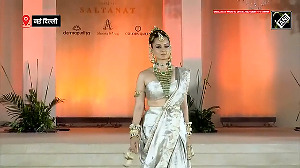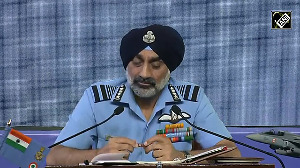This could happen some day. Following a long and tiring day at work, you unwind by popping some popcorn, curling up in a cosy chair and watching a movie -- on your mobile phone. The last bit might sound far fetched, but it really isn't.
Mobile content providers are hoping to bring mobile phone owners a comfortable wireless Web experience coupled with a new world of portable multimedia entertainment. It's not just a volley of creative frames shot with digital cameras or handicams that are gaining traction among the young cinema makers, the mobile phone cameras are getting their bit of publicity too.
Among the first ones, Hungama Mobile has begun by teaming up with leading Indian filmmaker Dev Benegal's maverick film production programme 24x7 Making Movies that will produce almost 100 films every year.
"It started off as a crazy idea," recalls Benegal, "What if, for one week, we could forget red tape, bureaucracy, development executives, financiers, the underworld mafia, film commissions and people who stifle creativity? What if a person could walk in and make a film? What if one could make films for free? No questions asked, no scripts scrutinised... no nothing."
Benegal's desire was to see how the young generation looks at the world. "I picked up the phone, called Apple Computers, and said, 'Back me on this crazy, impossible idea with your latest state-of-the-art equipment. Give me the best and nothing less.' I was expecting to be thrown out, to be shown the door," he confesses. A few hours later Apple called back saying they were ready to help out.
Benegal shared his "crazy" idea with Neeraj Roy, MD and CEO of Hungama who related to the idea of movies for contemporary audiences.
"I suggested that apart from theatrical release of 24x7 films we should take them across multiple vectors such as iTunes video, Internet and broadband, mobile phones, memory cards and even home video in an innovative manner," says Roy. Hungama Mobile understood digital distribution and this prompted the duo to start a partnership of sorts.
Participants were given 24 hours to conceive, shoot and edit their films, which could be between 24 seconds and 24 minutes. Filmmaker Anish Soman's Mud Island managed to get the attention of the Cannes Committee at the 2004 24x7 at IFFI Goa 2004.
He managed to impress the jury again with his next film, titled Just a Film.
"I wanted people to react to my movies," says the young filmmaker from Kerala. He is enthused by the idea of his film reaching out to audiences through newer platforms like mobile phones. Soman acknowledges, "It would definitely lend me contemporary audiences who will appreciate my creativity."
Another participant, Neha Raheja Thakkar and her eight-minute long movie called Erased, was awarded a special jury award by the 24x7 judges. "Erased is about a street kid who has just hit puberty and shows his obsession for a heroine (Kareena Kapoor) on a poster," she says. Raheja, who has worked with Prahlad Kakkar as a "set designer", now plans to take up filmmaking as a career.
Hungama Mobile that has already produced 35 short films, which are essentially a bevy of artistic expressions, now plans a second round of its 24x7 programme in February 2007 at Delhi.
"The potential of user-generated content (like short films) is huge. In fact, mobile video is expected to be a $10 billion market (globally) and almost half of the mobile entertainment will be user-generated content," says a Hungama spokes-person.
Mobile content provi-ders like Hungama mobile are investing up to 15 per cent of their revenues in developing new technologies like mobile videos and films.
"Mobile video content is expected to be the hottest thing in the days to come. We are banking on 24x7-like programmes to help us archive user generated content, which is similar to YouTube (an online video-sharing portal)," says Roy.
The mobile film making as an idea is a developing medium that could produce amateur to a serious breed of filmmakers. Mahashweta Burma could be one of them. She is all of 18 years but her short films are far from being immature pieces of work. She showcased her film at the 2004 24x7 at IFFI Goa.
"It was about the rape of pristine beaches by us who litter them with garbage. This time I have tried to capture child abuse, in a simple yet powerful way through my film Ghutan," she says.
A second-year college student of St Stephen's College, Delhi, Burma wants to pursue a career in film making. She says, "The best part was to be able to discuss my script with Dev Benegal sir, who helped me in penning suitable language for a film."
Brands like Sony have also kicked off movies meant especially for cell phones. Sony has introduced movies from the stable of Sony Pictures on memory cards of 128 megabytes size wherein all compatible handsets that play multimedia files shall be able to play movies like Stuart Little, The Hitch, Ghostbusters, Charlie's Angels: Full Throttle and Spiderman 2.
Nokia, along with Discovery Networks Asia, has launched the second season of Mobile FilmMakers 2006 Awards. The initiative, which began in 2005, claims to empower mobile phone users with the knowledge and technology of mobile filmmaking and offers a opportunity to showcase budding talent.
The Mobile FilmMakers 2006 Awards website showcases exclusive clips produced by celebrity filmmakers from Asia, as part of the mobile filmmakers gallery.
Among the filmmakers featured are Ekachai from Thailand (director of Beautiful Boxer, which won several international awards), Kelvin Tong from Singapore (director of horror movie The Maid), Bertrand Lee, also from Singapore, and Yasmin Ahmad from Malaysia (who won "Best Director" at the Malaysian Film Awards for her film Sepet).
The world over, mobile films have been recognised as expressions of creativity. When 8,500 visitors attended screenings of three-day Pocket Films Festival at Pompidou modern art museum, Paris, in October, it was an eye-opener in itself.
However, there are some sceptics who feel that the technology still needs to be in place for mobile films. And though mobile films are beginning to take off, it's still to early to project whether it can translate as a money spinner for these companies.
Nevertheless, the year 2006 has been a milestone in mobile phone cinema: maybe it's the emergence of what we will soon call "the third screen in the entertainment industry".






